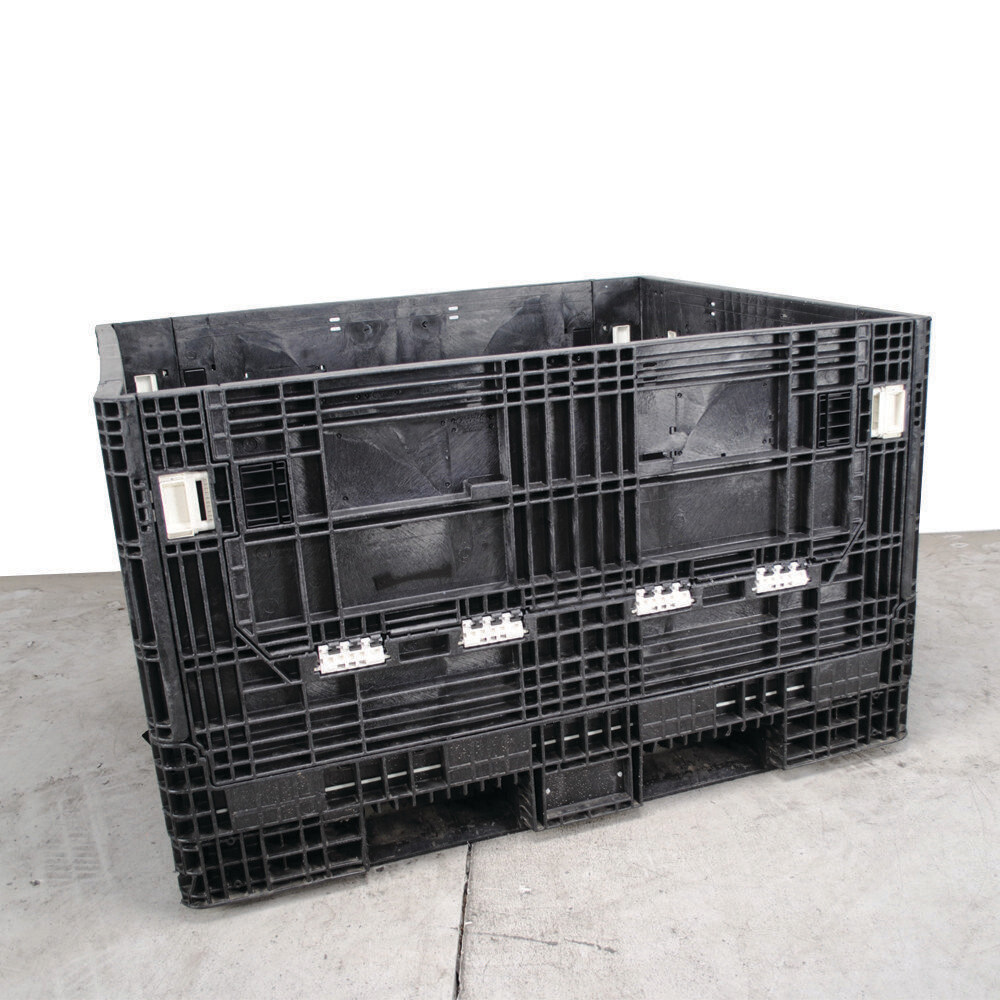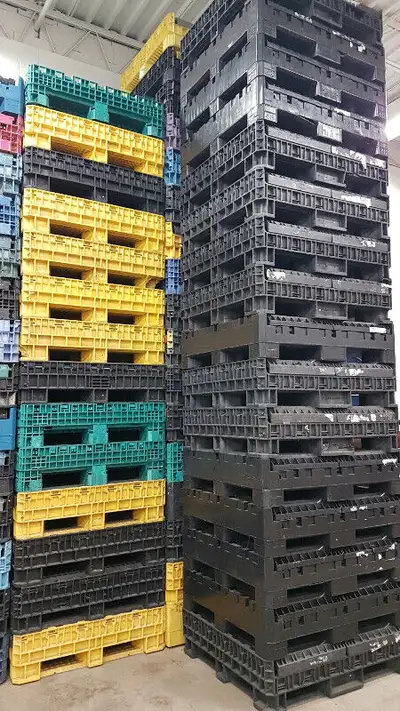How used bulk containers improve product handling across industries
Why Bulk Containers Are Vital for Sustainable and Economical Transportation
Bulk containers play a vital function in contemporary logistics. They promote the reliable movement of large quantities of products, consequently maximizing transport procedures. This approach not just reduces costs yet also lessens environmental influence with lower exhausts and waste generation. As industries look for more lasting methods, the adoption of mass containers is ending up being increasingly considerable. What ramifications does this change hold for future logistics and supply chain administration?

The Benefits of Utilizing Mass Containers in Logistics
Bulk containers transform logistics by improving effectiveness and sustainability. These containers permit the transportation of big amounts of items in a solitary journey, significantly minimizing the variety of journeys needed. This not just improves procedures but additionally minimizes labor expenses linked with handling, loading, and dumping. Furthermore, mass containers are designed to enhance area application within transport automobiles, guaranteeing that even more items can be shipped concurrently.
The standardization of mass containers also streamlines the logistics procedure. With consistent measurements, they can be quickly stacked and saved, leading to boosted stockroom monitoring. In addition, mass containers often include sturdy products that shield materials from damage during transit, thereby decreasing product loss and enhancing overall integrity. Consequently, services can experience enhanced supply chain efficiency, ultimately causing increased earnings and customer satisfaction. This mix of factors makes mass containers a vital asset in contemporary logistics.
Ecological Influence: Minimizing Waste and Carbon Impact
As industries progressively focus on sustainability, the adoption of bulk containers has actually emerged as a key strategy for minimizing waste and lowering carbon impacts. These containers minimize the usage of packaging materials, such as boxes and plastic, therefore especially decreasing overall waste generation. By combining deliveries, bulk containers enhance transport efficiency, permitting more products to be moved per journey. This decrease in journeys directly associates with reduced greenhouse gas emissions, contributing to a smaller carbon impact.
Moreover, bulk containers can usually be reused or recycled, better reducing ecological influence. The sturdiness of these containers guarantees they can stand up to several transportation cycles, lowering the need for single-use choices. refurbished bulk containers. By enhancing logistics and advertising reliable source usage, mass containers not only sustain sustainable practices yet additionally encourage industries to align with worldwide environmental goals. Eventually, their execution shows a dedication to eco-friendly stewardship and responsible resource management
Cost Financial Savings: Just How Mass Containers Lower Transport Expenses
While many business look for methods to enhance their profits, using bulk containers presents a considerable chance for reducing transportation expenses. Mass containers make best use of the quantity of products transferred, permitting companies to deliver bigger quantities at once. This performance lowers the number of trips required, straight reducing fuel costs and minimizing labor expenses connected with loading and unloading.
In addition, bulk containers often feature structured styles that maximize space application within transport automobiles. This suggests fewer voids, leading to more effective use of available ability. The toughness of mass containers can reduce the danger of item damage during transit, ensuring and lowering losses that even more items show up undamaged.
Enhancing Supply Chain Efficiency With Bulk Storage Solutions
Bulk storage options play a necessary role in enhancing supply chain performance by enhancing supply administration. By settling goods right into less, bigger containers, organizations can considerably lower managing prices connected with constant transfers and processing. This streamlined approach enables better monitoring and administration of inventory, inevitably causing boosted operational performance.
Streamlined Stock Monitoring
Efficient inventory monitoring is important for optimizing supply chain procedures, specifically when organizations take on bulk storage space services. These solutions make it possible for businesses to keep higher supply levels while decreasing the frequency of replenishment. By combining products into mass containers, business can improve their inventory procedures, lowering the intricacy related to tracking multiple smaller sized packages. This method promotes precise stock counts and boosts projecting accuracy, allowing for more informed decision-making. On top of that, mass storage space remedies simplify stockroom company, making it easier to situate and accessibility products when needed. Therefore, companies can accomplish an extra efficient inventory turnover price, inevitably boosting overall supply chain efficiency and minimizing the possibility of stockouts or overstock situations.

Lowered Handling Costs
The implementation of bulk storage services not only streamlines supply management yet also considerably reduces taking care of expenses across the supply chain. By settling products into mass containers, firms reduce the need for constant handling and transfer between different storage and transport devices. This strategy lowers labor costs associated with loading, discharging, and moving smaller sized plans. In addition, mass storage decreases the frequency of shipments, causing reduced transportation expenses and decreased fuel usage. Therefore, businesses can maximize their logistics operations, allowing for a more reliable allocation of sources. Inevitably, decreased dealing with costs add to enhanced overall supply chain efficiency, fostering an environment that sustains both sustainability and economic viability.

Flexibility of Mass Containers Throughout Various Industries
Many sectors have unique requirements for transport and storage, bulk containers have actually arised as a flexible remedy that meets a wide array of requirements. These containers, varying from huge containers to specialized storage tanks, can fit varied products, including granules, liquids, and powders. In the farming market, mass containers promote the transport of fertilizers and grains, while the food and drink market utilizes them for active ingredients and completed items. The chemical industry depends on mass containers for securely moving unsafe products, guaranteeing compliance with security regulations. Furthermore, construction companies take advantage of bulk containers for transferring aggregates and various other products. Their versatility encompasses different settings of transportation, consisting of ships, trains, and vehicles, improving logistical effectiveness. This flexibility not only streamlines procedures across various markets however likewise promotes sustainability by lowering packaging waste and enhancing room en route. Therefore, mass containers play a crucial function in modern-day supply chain administration.
Future Trends in Bulk Container Usage and Sustainability
The future of bulk container usage is significantly shaped by innovative products development that improves sustainability. In addition, automation in logistics guarantees to simplify procedures, minimizing waste and boosting performance. Welcoming circular economic situation techniques will certainly better reinvent how bulk containers are created, used, and recycled, promoting a more sustainable transport landscape.
Cutting-edge Products Growth
As markets progressively focus on sustainability, innovative materials development in bulk containers becomes a considerable element in improving green transportation options. Researchers and makers are exploring eco-friendly plastics, recycled compounds, and light-weight metals to minimize environmental effect. These materials not just minimize waste however likewise boost gas performance by reducing the general weight of containers. In addition, improvements in wise products, which can adjust to varying conditions, boost the resilience and capability of mass containers. The combination of these innovative materials lines up with circular economic climate principles, advertising reuse and recycling. As the need for sustainable practices expands, the advancement of such products will certainly play a vital role in forming the future of mass container use in logistics and transport.
Automation in Logistics
Substantial improvements in automation are positioned to transform logistics and the application of bulk containers, boosting sustainability in transport. Automated systems, including drones and independent automobiles, are streamlining the movement of mass containers, lowering the dependence on conventional fuel-powered transportation. These innovations maximize directing and filling procedures, reducing vacant miles and improving gas effectiveness. Additionally, automated supply administration systems enhance monitoring and tracking of bulk containers, guaranteeing better source allotment and reduced waste. The assimilation of the Web of Things click here now (IoT) allows real-time information analysis, making it possible for aggressive decision-making that aligns with sustainability objectives. As automation remains to develop, it is anticipated to drive additionally developments in mass container use, eventually sustaining more lasting logistics methods and reducing the ecological impact of transport.
Round Economic Climate Practices
Advancements in automation are establishing the phase for a much more incorporated approach to round economy methods in the domain name of bulk container usage. As sectors progressively welcome sustainability, mass containers are being developed for long life and reusability. This shift not only minimizes waste yet also improves source performance. Companies are taking on techniques such as closed-loop systems, where made use of containers are collected, refurbished, and reintroduced right into the supply chain. Additionally, wise modern technologies track container life cycles, assisting in far better management and minimizing ecological influence. The collaboration between makers, logistics companies, and end-users is crucial in developing standards for sustainable container use. refurbished bulk containers. Future fads show an expanding emphasis on materials that are recyclable and eco-friendly, more reinforcing the circular economy's principles wholesale transportation

Regularly Asked Concerns
What Materials Are Bulk Containers Commonly Made From?
Mass containers are generally constructed from long lasting materials such as high-density polyethylene, light weight aluminum, cardboard, and steel. These materials offer versatility, stamina, and protection, making them ideal for carrying different items in various sectors efficiently.
How Do I Choose the Right Size Mass Container?
Choosing the best size bulk container involves assessing the volume of materials to be moved, taking into consideration managing devices compatibility, and evaluating storage space requirements. Proper size warranties performance in transport and lessens waste throughout shipment.
Are Bulk Containers Reusable or Recyclable?
Bulk containers are typically recyclable, developed for multiple trips, boosting sustainability. Numerous can likewise be recycled, depending on the materials used. Choosing recyclable options even more minimizes and supports ecological objectives waste in transportation practices.
What Safety And Security Laws Relate To Mass Container Transportation?
Safety guidelines for bulk container transportation consist of conformity with the Department of Transportation standards, correct labeling of unsafe products, structural integrity assessments, and adherence to weight limits to assure risk-free handling and avoid accidents throughout transportation.
How Can Businesses Transition to Making Use Of Bulk Containers Properly?
Companies can transform to bulk containers by examining current logistics, educating staff on handling, investing in appropriate tools, enhancing inventory administration, and teaming up with providers to assure compatibility and efficiency throughout the supply chain.
As sectors increasingly focus on sustainability, the fostering of bulk containers has actually arised as a key approach for decreasing waste and reducing carbon impacts. By consolidating materials right into mass containers, firms can simplify their supply procedures, minimizing the complexity linked with tracking numerous smaller plans. As industries significantly prioritize sustainability, innovative materials development in bulk containers their explanation arises as a substantial aspect in enhancing environmentally friendly transport options. Automated systems, consisting of drones and autonomous vehicles, are simplifying the activity of bulk here containers, reducing the reliance on standard fuel-powered transportation. In addition, automated supply monitoring systems boost monitoring and surveillance of mass containers, ensuring much better resource allotment and decreased waste.